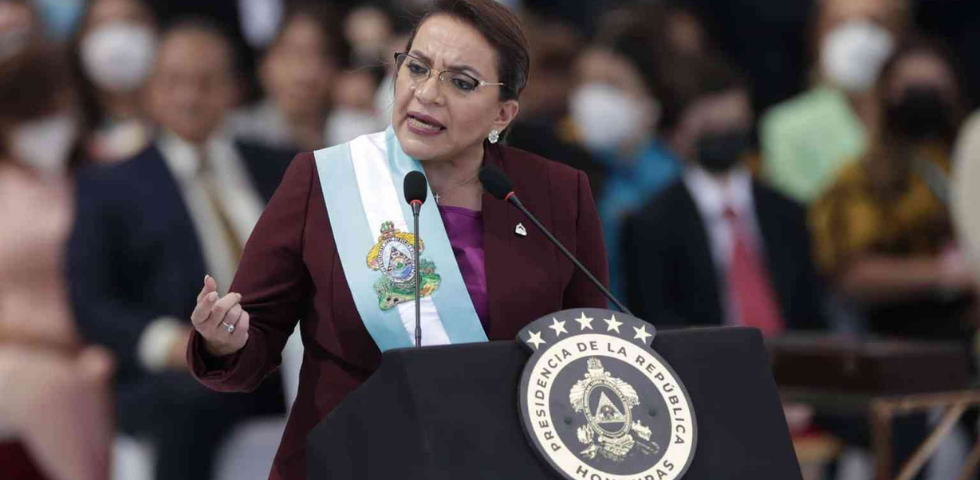“God was with the midwives, so the people grew and became very strong” Ex 1:20
Honduran hope has a woman’s name: Xiomara Castro de Zelaya, the first woman president of Honduras. In a two-party history, in a violent patriarchy and oppressive militarism, the elected president Xiomara Castro is sworn in.
Since 2010, when fraudulent elections were held, the “national” party began a period of government that lasted 12 consecutive years, with an unconstitutional presidential re-election. This “nationalist” government left the Honduran state stripped, indebted and institutionally worn out. Some of the characteristics that marked this period of government were:
- A “narco-government”, both military and political.
- A government that violates human rights and the rights of indigenous peoples.
- An indebtedness due to the plundering of state coffers.
- A corrupt government in all institutional spaces.
- Large-scale impunity, shielded by different laws favourable to injustice.
- The surrender of indigenous and peasant territories for the ZEDES.
- Favouring extractivism that dispossesses and pollutes natural resources.
- Criminalisation and assassination of human rights and environmental defenders.
- Increase in femicide and violence against women.
- Murders of members of the LGBTI community.
- A government that persecutes represses and criminalises organised civil society.
- Caravans of migrants, fleeing in desperation from violence and poverty.
The families who have been forced to migrate both in “caravans” and in smaller groups are the clearest expression of the desperate situation of thousands of Honduran citizens. As one US newspaper put it: “People from Honduras have long migrated to the United States. They are fleeing the violence of organised crime, economic misery and the indifference of a government led by a president accused of links to drug trafficking”.[1] This situation of a failed government grew in the post-election crisis of 2018, where the corruption of the national party overflowed; and it was in this context that the so-called “caravans” of migrants began
The reality brought about by the Covid-19 pandemic in 2020, coupled with the natural phenomena of the two hurricanes that impacted Honduras, affecting 50% of the country’s population and leaving at least 400,000 jobs lost this year.
Together with the generalised violence, this situation continued to drive Honduran families to migrate from the country. Let us also keep in mind that “in 2021, Honduras enters for the first time the ranking of the 25 territories with the most displaced people according to the Global Report on Internal Displacement…Within this ranking, Honduras ranked eleventh, reporting a figure of 937,000 people displaced abroad and 247,000 internally displaced for reasons of conflict and violence, making it the Latin American country with the highest number of displacements.”[2]

It is clear that the panorama of forced migration has worsened in recent years: “Honduras is the country with the third-highest number of applications for international protection in Spain. A total of 5,563 Hondurans applied for international protection”.[3]
The situation of deportees also evidences the deteriorated reality of the vast majority of the population, “The number of people deported to Honduras increased by 33.2 % so far in 2021 compared to the same period in 2020”.[4]
The enthusiasm for the change of government in Honduras is not enough for the clamour for justice to be fulfilled in these territories. Nor will justice, peace and food on the table come to every home just by invoking God with a celebration in the chapel dedicated to the Virgin of Suyapa. Instead, this is a time for civil unity, for taking up the struggles of the native peoples and peasant communities. A time for strengthening the institutions that defend human rights, for re-establishing the autonomy and credibility of the powers of the State. A time to reverse the laws that have allowed the people’s dispossession, strengthening the autonomy and community leadership of the municipalities, among other challenges.
For Christians, it is time to proclaim and live the beatitudes of Jesus (Mt 5:1; Lk 6). To renew hope and walk humbly with our God; for Christian leaders and church officials to covenant with justice and not with the corrupt powerful; to build a poor church of the poor; to learn to be a peaceful country that values education more than the institution of the military. As disciples of Jesus, we must allow ourselves to be led by his liberating, consoling and reality-transforming Spirit (Lk 4:16).
René Flores, OFM
––––––––––––––––––––––––
[1] https://www.nytimes.com/es/2021/04/06/espanol/honduras-migracion.html
[2] https://eleutera.org/honduras-rompe-record-de-migracion-irregular-en-2021/
[3] Ibid.
[4] https://www.swissinfo.ch/spa/honduras-migraci%C3%B3n_las-deportaciones-de-hondure%C3%B1os-suben-un-33-2—en-lo-que-va-de-2021/46928938

